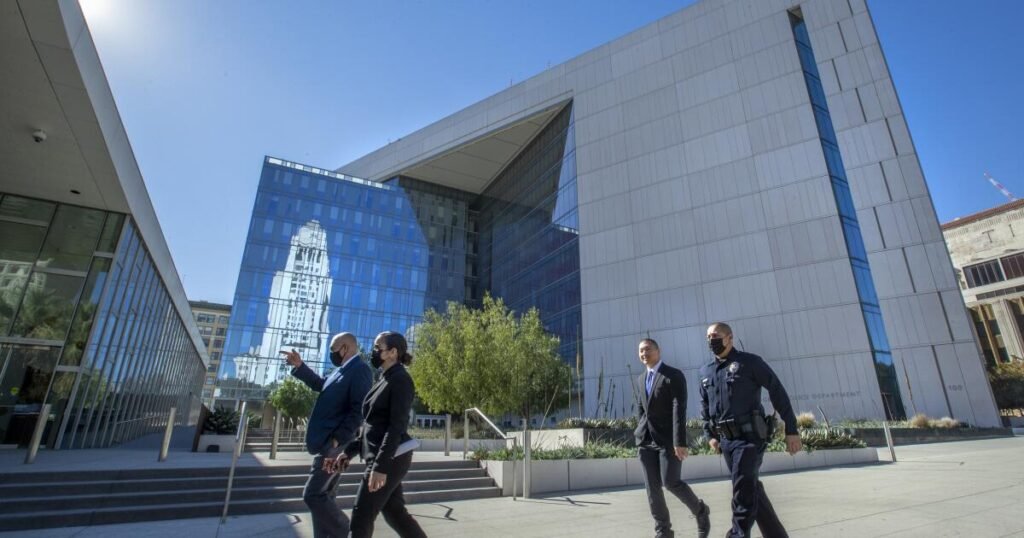As the deadline for introducing the ballot measure approaches, the Los Angeles City Council is divided over language in the proposed reforms, including giving the police chief the power to fire officers for serious misconduct.
Some city officials support a plan that would give the chief executive the power to fire officers who commit sexual misconduct, fraud, excessive use of force, abuse on the job and other violations covered by SB 2, a state law that strips officers who commit such acts of their badges.
Other officials worry that limiting the offenses that qualify for firing would undermine the police chief's ability to fire officers who have violated the public trust in other ways but don't fall under the disqualification law. In either scenario, officers can appeal their firings, just like most other public employees.
The debate threatens to derail years of efforts to reform a system used to weed bad cops out of the LAPD that has come under intense criticism in recent years for allowing officers found to have committed serious crimes to keep their jobs.
The council proposal, which must be approved by voters on the November ballot, would eliminate the option for officers to have their cases reviewed by civilian-only disciplinary boards, which tend to be lenient in imposing discipline.
The full council is expected to vote on the issue on Tuesday.
The original proposal was introduced last year, and some city and police officials expressed frustration that the process had dragged on so long that decision-makers were scrambling to finalize the proposed changes.
City Councilman Hugo Soto Martinez questioned the use of binding arbitration for officers challenging their firings or suspensions, pointing to studies and testimony from city and police leaders across the country that show outcomes typically favor the accused employee.
He said unless the City Council reaches an agreement Tuesday, it would be better to wait until next year to give city officials enough time to work out the ballot language.
“The current proposal would gut the most important parts of this reform and create even more opportunities for officers who commit egregious misconduct to escape accountability,” he said in response to questions from The Times. “This last-minute change has left City Council members, city staff and even our lawyers confused. It would be irresponsible to move forward without thorough scrutiny of what we are putting before voters.”
He continued, “We introduced a police discipline reform plan over 16 months ago. We have seen city officials do nothing for months, then try to push through changes at the last minute without any transparency or public input. This is exactly why so many people don't trust their government.”
Soto-Martinez, a former labor union activist, formed an unlikely alliance last year with a City Council colleague, former police union lawyer Tim McCosker, to call for scaling back civilian involvement.
But there have been signs of friction recently.
A heated debate Friday C MeetingCouncil Rules CommitteeIn it, McCosker and representatives from the Los Angeles Police Department and the City Attorney's Office debated whether the draft language actually reflected the Legislature's intent.
McCosker, who supports adopting the SB 2 standard, said police chiefs can recommend termination for other infractions, but they must go through the rights committee process.
“I am deeply outraged that the city attorney last night changed the tenor of my motion and threw words at me. I am beyond outraged that the city attorney is allowed to come here and change the tenor of my motion and shove words in my mouth,” he said. “And they're making the argument that it's going to be difficult for them to defend. Sorry. It's going to be difficult. Do we need 300 more lawyers?”
Critics say the current disciplinary system lacks transparency and severely undermines accountability efforts.
The council's tentative plan, which must be approved by Los Angeles voters in November, focuses on a disciplinary board made up entirely of civilians that would review cases of officers accused of misconduct and decide whether to fire or discipline them.
“The bottom line is police accountability and transparency and holding officers to high standards, and that's the main goal here,” Michael Rimkunas, deputy director of the Office of Professional Standards, said in an interview.
Limkunas and other senior ministry officials spoke out against several clauses in the parliament's latest proposals.
The proposal is controversial because it would effectively reverse a 2017 charter amendment that gave officers the option to have their disciplinary cases heard exclusively by civilians and move them to an arbitration process that opponents say favors accused officers.







